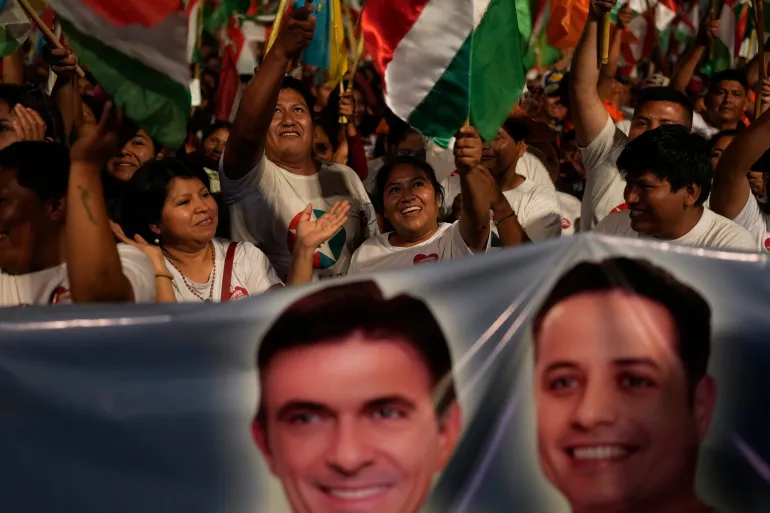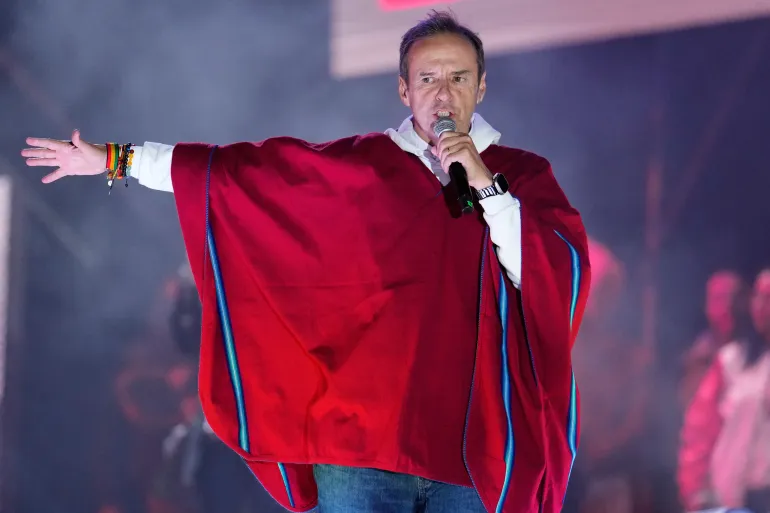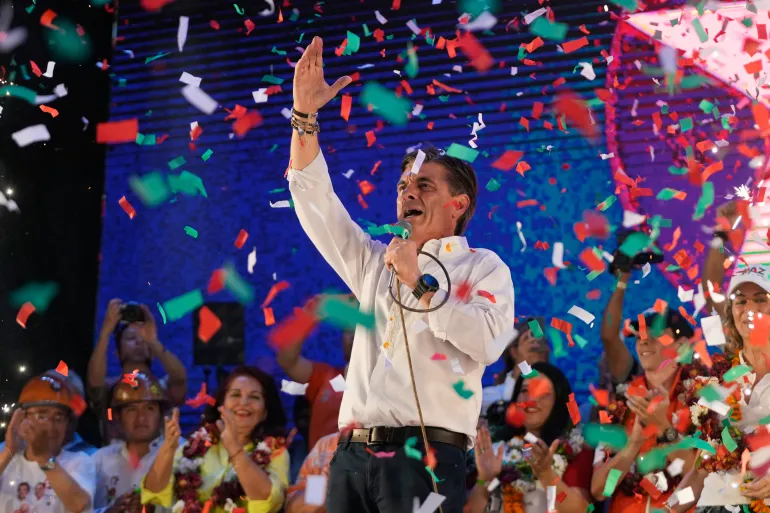As voters in Bolivia prepare to go to the polls for the final round of the country’s presidential election, there is no left-wing candidate on the ballot for the first time in nearly two decades.
Since the last election, the current governing party, the Movement Towards Socialism (MAS), has suffered an implosion, with party leaders splintering off and attacking one another.
Recommended Stories
list of 3 itemsend of list
Amid the fracas, MAS failed to advance a candidate to the run-off election, meaning its leadership — nearly uninterrupted since 2006 — is slated to come to an end.
A centrist and a right-wing candidate are now facing off in Sunday’s highly anticipated run-off.
But the election is unlikely to smooth over the divides that have fractured and destabilised Bolivian politics in recent years, with a severe economic crisis spurring continuing unrest.
Who are the candidates? What issues are front and centre for voters? And what challenges could the new government face in the months ahead? We answer those questions and more in this brief explainer.
When does voting take place?
The run-off vote will take place on October 19, with the winner of the election inaugurated on November 8.
What was the result of the first round?
The final stage of the election is itself a sign of the shifting and unpredictable state of the country’s politics.
Rodrigo Paz, one of the two final candidates, was the surprise victor in the first round of voting despite registering less than 10 percent in early polling. He carried more than 32 percent of the votes in the August 17 general election.
His rival is Jorge “Tuto” Quiroga, a former president who came in second place with nearly 27 percent of the vote.
Neither met the threshold to win the presidency outright, which would have required winning 50 percent of the vote, or 40 percent with a 10-point margin over the nearest competitor.
Who is Rodrigo Paz?
Paz is a senator and the son of the former left-wing President Jaime Zamora.
Though he has aligned himself with various parties throughout his career, in this election, he is representing the centre-right Christian Democratic Party.
Paz has pitched himself as a more moderate voice who will embrace pro-market policies while taking a cautious approach to austerity measures. “Capitalism for All” is his campaign slogan.
His running mate, meanwhile, is Edman Lara, an evangelical Christian and former police officer who resigned from his position and became a popular figure on social media for his outspoken criticism of corruption.

Who is Jorge Quiroga?
Jorge “Tuto” Quiroga is a businessman and former president.
Early in his career, he worked in Texas for the multinational tech company IBM. But his interests shifted to politics, particularly in the 1990s, and he even worked under Paz’s father as Bolivia’s finance minister.
In 1997, Quiroga ran as the running mate on the successful presidential ticket of Hugo Banzer, who led a military dictatorship in the 1970s. But when Banzer was diagnosed with cancer and resigned in 2001, Quiroga succeeded him as president, serving the remainder of his term.
Quiroga’s subsequent bids for the presidency have fallen short: He lost in 2005, 2014 and 2020.
In this election, he is running on a stridently pro-market platform as the head of a right-wing coalition, the Libre Alliance.
Quiroga’s running mate is Juan Pablo Velasco, a 38-year-old tech entrepreneur.
What do the polls say?
Polling currently shows Quiroga with a slight advantage, but analysts have pointed out that polling before the first round of voting failed to detect support for Paz.
A poll taken between October 1 and 6 by the research firm CB Consultora found that Paz has an approval rating of 42.5 percent. Quiroga, meanwhile, leads with 56.7 percent approval.
While 75 percent of respondents said they would vote in the run-off, CB Consultora said protest votes — with ballots intentionally left blank or spoiled — are expected to increase.
What happened to Bolivia’s left?
Under the presidency of Evo Morales from 2006 to 2019, the left-wing MAS party oversaw a period of strong economic growth while simultaneously decreasing inequality, a rare feat.
That translated into electoral dominance for Morales, who is considered the country’s first Indigenous president.
But an electoral crisis in 2019 resulted in Morales fleeing the country after seeking a contested fourth term, in circumstances that his supporters have characterised as a coup.
The crisis caused a brief interruption in MAS leadership, and the post-election period saw turmoil and widespread protests, with the short-lived right-wing government overseeing a deadly crackdown.
In 2020, the left returned to power when Morales’s finance minister became the current president, Luis Arce. But internal divides have critically weakened MAS, leading to Morales leaving the party.
Courts have barred Morales, who faces an arrest warrant for alleged statutory rape, from seeking a fourth term. But Morales has persisted in his efforts, characterising the ban on his candidacy as an assault on his rights.
He has called upon his followers, many of whom are rural and Indigenous voters, to boycott the vote.
What issues are front and centre?
For many Bolivians, concerns about the economy and the cost of living are top of mind as they head to the polls.
High inflation and fuel shortages, along with dwindling foreign currency reserves, have been a source of hardship.
“People are waiting in line for hours at a time for gasoline,” said Kathryn Ledebur, director of the Andean Information Network, a Bolivia-based group that promotes human rights. “Diesel, which is important for the transportation of other goods, is even worse.”
Polling compiled by the Americas Society/Council of the Americas (ASCOA) shows that 24 percent of Bolivians consider the economy their primary concern this election season. Another 17 percent cited price increases as a top concern, and fuel shortages were at 14 percent.
What controversies have defined the election?
Velasco, Quiroga’s vice presidential running mate, has faced scrutiny over a series of racist social media posts he made in the past, celebrating violence against the country’s Indigenous population.
The posts, some of which are nearly 15 years old, were initially unearthed by an Argentinian social media figure. Bolivian fact-checking agencies have since verified the posts.
Velasco responded by denying that he authored the posts. He has also attacked the fact-checkers, prompting the Bolivian press association to release a statement in support of the fact-checking agencies.
What policies have the candidates proposed?
Both Quiroga and Paz are promising pro-market policies and a departure from the left-wing programme that has dominated Bolivian politics for the last two decades.
Where the two candidates differ is over how quickly to implement those economic changes.
Quiroga has said that he will cut spending on social programmes and fuel subsidies, privatise state enterprises, and seek assistance from the International Monetary Fund (IMF).
Paz has been more hesitant when it comes to embracing calls for austerity and steep cuts to social programmes, although he has also said that he would cut fuel subsidies.
He has also suggested that Bolivia could lower tariffs to help import goods that the country does not produce itself and expressed interest in greater integration into regional trade blocs, such as MERCOSUR.

What will the election mean for relations with the United States?
The administration of US President Donald Trump has expressed approval over the prospect of a right-wing government in Bolivia.
Bilateral ties under MAS leadership had been strained over conflicting policies towards growing coca, a major crop in Bolivia and the raw ingredient for cocaine.
On October 14, US Secretary of State Marco Rubio addressed the election outright, calling it “important”.
“Later this month, there’ll be an election in Bolivia,” Rubio said. “After 25, 30 years of anti-American, hostile governments, both of the candidates running in that election, in the run-off election, want strong and better relations with the United States. Another transformative opportunity there.”
Morales, a firm critic of the US “war on drugs”, expelled the US Drug Enforcement Agency (DEA) in 2008 and the US Agency for International Development (USAID) in 2013, alleging it was working to influence Bolivian politics.
“There was a great deal of frustration in Washington, DC, because this was a refutation of the idea that, to govern successfully, you need cooperation and funding from the US,” said Ledebur.
Both Paz and Quiroga have said that they will seek closer ties with the US. Quiroga, in particular, has been a critic of left-wing governments in Latin America, including in Venezuela, Cuba and Nicaragua, with which MAS had cultivated ties.
That shift comes at a moment when the Trump administration is taking on a more aggressive stance in Latin America, pushing a highly militarised approach to combating drug trafficking and using US influence to assist right-wing allies in countries such as Argentina and Brazil.

What’s next for the Bolivian left?
After years of dominance, Bolivia’s political left is preparing for a period in the political wilderness.
The candidate for MAS, Eduardo del Castillo, won just 3.2 percent in the first round of voting in August. A former MAS member, Andronico Rodriguez, won approximately 8 percent of the vote.
Many former MAS supporters have turned to Paz due to his populist stance and softer approach towards economic austerity, and Ledebur says that the once-powerful left will have to mend internal rifts and find a new path forward.
But the forces that have powered the Bolivian left for decades, such as Indigenous and rural voting blocs, are likely to remain a formidable force, even if MAS finds itself out of power.
Ledebur says that efforts to implement harsh austerity measures could spark strong backlash and protests.
She predicts that conflict with the new government could help unite the left around a common cause, but that doing so will take time.
“The left will definitely have to change something after its defeat in the election,” she said. “There will be a reconfiguration, but it could take a long time.”